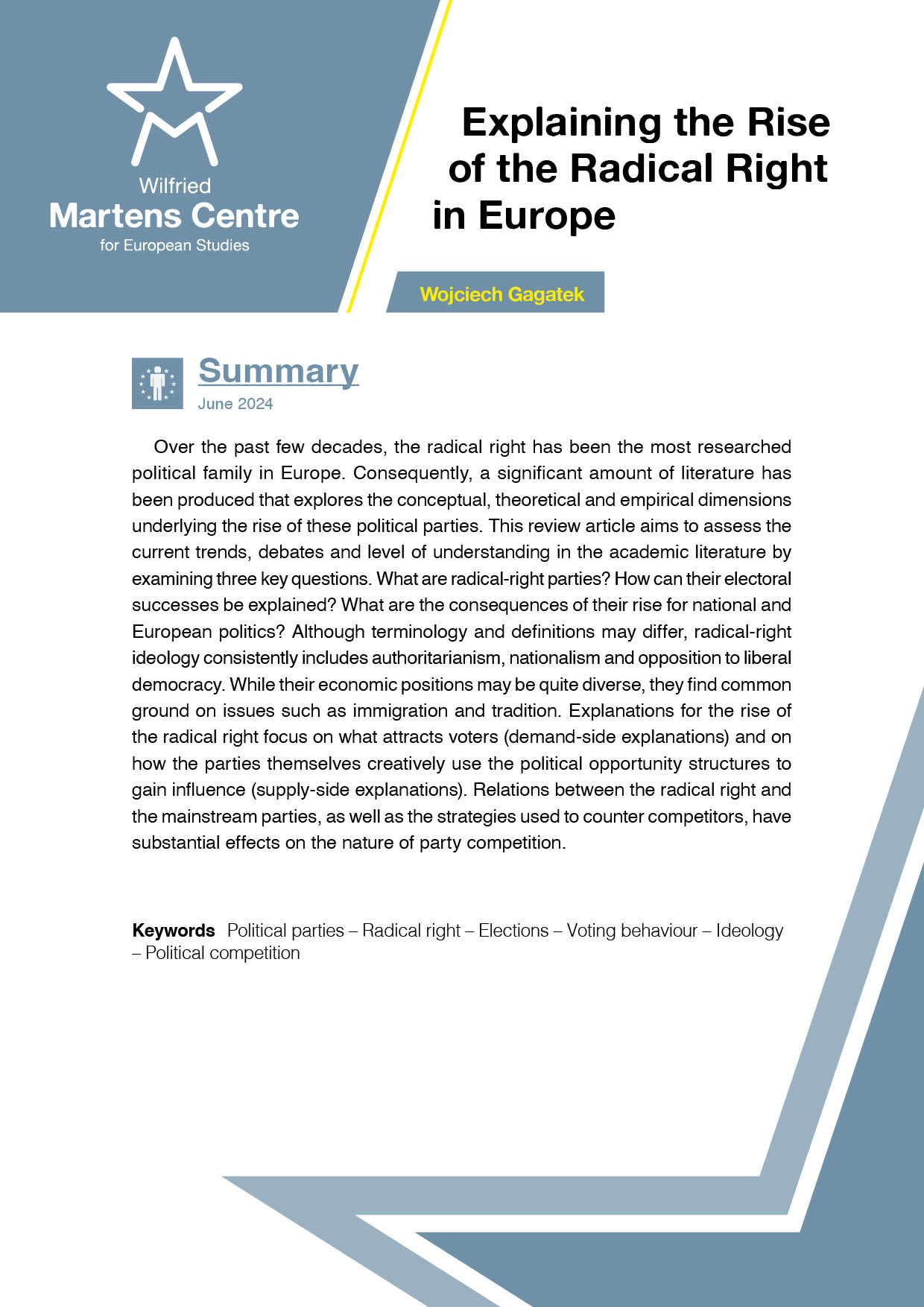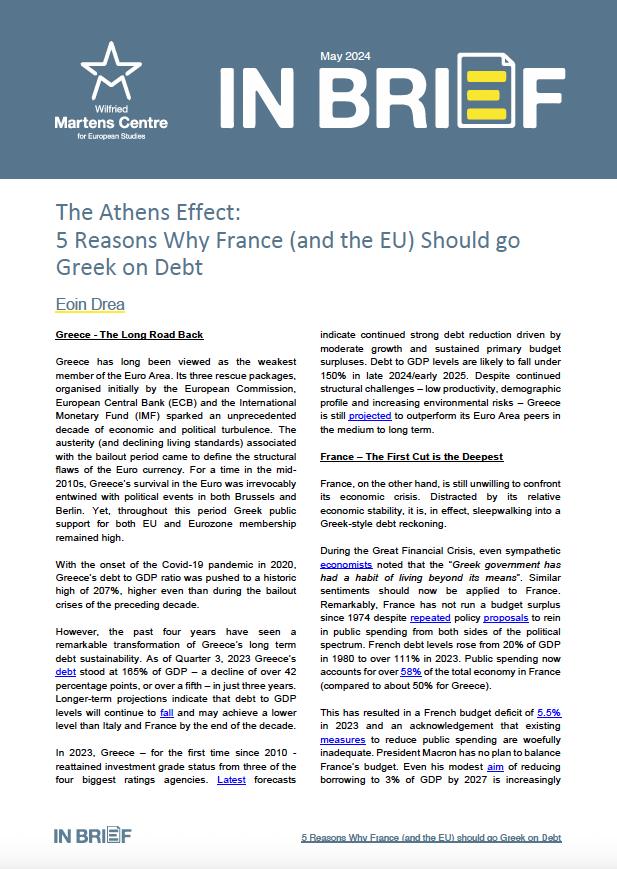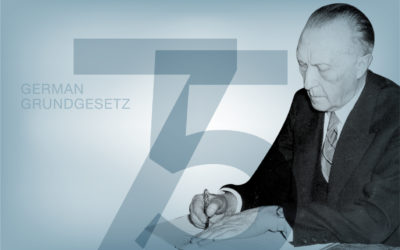Angela’s bittersweet victory: takeaways from Germany’s election
25 September 2017
Watershed. Earthquake. Tectonic shift: the hyperbole is palpable in Berlin, on the morning after a memorable election. But let’s be clear: this election will remain memorable not because of a change of Chancellor. Angela Merkel will lead the next government as much as she has led the previous one. But this election will be remembered for three other reasons:
- First, both big tent parties, Angela Merkel’s Christian Democrats (CDU/CSU) and Martin Schulz’ Social Democrats (SPD), have dramatically lost votes. Most of the smaller parties have gained in strength, and the new Bundestag will have six parliamentary groups (i.e. seven parties, because CDU and CSU have a common caucus). While there is no desire for radical change in Germany – the economy is doing very well – there seems to be a certain unease with the way both big parties have been running things.
- Second, Germany now has a very self-confident right-wing populist party, AfD, which will be the third strongest force in the Bundestag. That means there will be more provocations, more passionate debate, but also more nonsense in Parliament.
- Third, in a refreshingly clear and early move, right after the first exit poll, Germany’s Social Democrats have taken themselves off the map for coalition talks, saying they will have to rebuild themselves in opposition, and also in order to prevent the AfD from being the strongest opposition party.
Source: The Federal Returning Officer
Here are the three most important takeaways from this election:
1. The only coalition option for the moment seems to be ‘Jamaica’ – a four party coalition of CDU, CSU, Liberals (FDP) and Greens
Even before the election, everyone knew that coalition building would be tricky. But now that the SPD has clearly ruled out remaining in government, there is only one option left. Its nickname refers to the colours of Jamaica’s flag – black (CDU/CSU), yellow (FDP) and green. It also implied, until now, a certain outlandishness which is now gone. But coalition talks will be excruciatingly difficult. In immigration policy, energy and environment, as well as family and gender questions, conflicts between the Greens and the others (especially the CSU) are obvious.
The FDP may turn out to be difficult in questions of the Eurozone. And at the end, any coalition deal will have to be approved by the members of both Greens and the FDP: by no means a foregone conclusion. If this coalition option fails, either the SPD will have to join the government against its will, or there will be snap elections. Both options sound unpalatable, hence ‘Jamaica’ may well be condemned to success.
2. The right wing populist Alternative for Germany (AfD’s) success is news for Germany, but will not revolutionise German politics
Contrary to what many of Germany’s scandalised bien-pensants are now saying, Germany is getting what other European democracies (France, Austria, the Netherlands and many others) have had for a long time: right wing populists in the national Parliament. Some in the AfD rehash elements of racist nationalism, and many others are Eurosceptic conservatives, but most of them bear a fundamental grudge against Chancellor Merkel’s migration policy since 2015.
According to all opinion polls made around the election, people did not vote AfD because of economic fears or income inequality. They did so as a protest vote against what they perceived as a government losing control of our borders, a rise in crime and terrorism, and against a very centrist drift of the CDU in recent years. New infighting between and inside CDU and CSU about identity politics and the right amount of social conservatism will be unavoidable.
As to the AfD, there will be ugly scenes in the Bundestag when its politicians claim that Germany’s coming to terms with its past (Vergangenheitsbewältigung) belongs to the past. But the one million former CDU/CSU voters that voted AfD in 2017 will not be impressed if they’re labelled Nazis by everyone else. We will have to live with this paradox for the time being. It makes no sense to frame European politics primarily in terms of ‘open vs. closed’ instead of left vs. right, which is another reason why the SPD’s decision to join the opposition benches is probably a good idea.
3. Changes in Germany’s foreign and European policy will be only gradual – but they will be in the right direction
In a ‘Jamaica’ coalition, Chancellor Merkel will most likely determine foreign affairs even more than in recent years. She will continue to represent the steady hand at the helm in turbulent times, as she emphasised time and again on election night. In the Franco-German couple, the ideas will mostly come from Emmanuel Macron (he has announced a major speech this week) and Angela Merkel will accept some and reject others.
The FDP’s staunch opposition to a transfer union in the Eurozone will limit her maneuvering space. She will definitely reject the notion of a two-speed union, but together with EU institutions uphold the rule of Law in Europe, against individual governments such as Poland’s and Hungary’s. But she will want to avoid the impression of a new East-West conflict between old and new member states.
On European defence, a ‘Jamaica’ coalition is likely to push forward together with France, but incrementally and within NATO, not replacing the Alliance. Sanctions against Russia are set to remain in place – the Greens’ disdain for Putin will likely help Merkel against any appeasing steps that CSU and Liberals might have in mind.
Whether all this is really enough to respond to the urgent need for leadership in Europe, in times of Anglo-Saxon withdrawal through Brexit and Trump, and mounting insecurity in the EU’s neighbourhood, that is the question. But if she wants to form a legacy beyond the 2015 refugee crisis, Angela Merkel will have to push Germany to a more active role in European and international security.
Finally, on this bittersweet election night, most observers agree that Angela Merkel’s fourth term as Chancellor will also be her last. But if she wants to leave her successor, whoever it may be, a fair chance of proving themselves in power, she might have to leave the stage a year or so before the election in 2021.
At the moment, nobody can really imagine a CDU without Angela Merkel, or Germany or Europe without her. And yet, that moment will come. The complicated coalition talks of the next few weeks, and the difficult government afterwards, may yet look harmless compared to the bumpy times of 2020 and beyond.
ENJOYING THIS CONTENT?





















